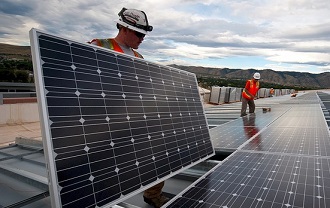| Back to Back Issues Page |
 |
|
English Detective # #95- 3 sources of hope for climate change, 11-21-17 November 21, 2017 |
I have been hesitant to talk much about climate change in English Detective. It’s already so well known—and often so controversial. What could I include that you don’t already know?
Psych, Tech, & Economic Vocabulary for Reducing Climate Change
I made a crossword puzzle of the most used new or less common vocabulary in the talk and those articles. I hope it will help you check your understanding of what you’ve read. (Several of the words have more than one meaning. I’ve used the meaning in the climate change and psychology context.) The answers are here. One thing I couldn’t include on the crossword was a good explanation of renewable energy. “Renewables” are solar energy and wind power, available energy coming from the sun; so we have an unlimited, renewable supply and won’t run out of them. Fossil fuels are not renewable: when they are gone we cannot get more. Basic Weather and Climate Change Vocabulary
(This is the important information from English Detective #71 on climate change vocabulary. Much of that issue is no longer relevant, so I took it out of the Back Issues.) I’ve been looking at some resources teaching climate change vocabulary, and others that discuss how people can adapt to the changes we cannot avoid. These pages are easier than most of the vocabulary readings I find, but I think they are interesting for adult English learners as well as kids—anyone who would like to read a little about climate change in fairly simple English (high beginner up.) All the links are on one page, along with several exercises to practice the vocabulary. See Climate Change and Weather Vocabulary on EnglishHints. The variety of practice exercises (categorizing, noting synonyms, and matching words with their meanings) all help make the mental connections necessary for long-term memory. A note if you get gmail: Have you missed any issues of English Detective? if you find English Detective in your Promotions box, you can move it to your Primary box (if you want) by clicking on it and dragging it there, then clicking Yes when asked if you want to always get it in the Primary box. If you are not already getting English Detective, you can subscribe by completing the form here. (It's free!) Also, you can reach me by mail at 1752 Driftwood Drive, El Centro, CA 92243, USA. |
| Back to Back Issues Page |
